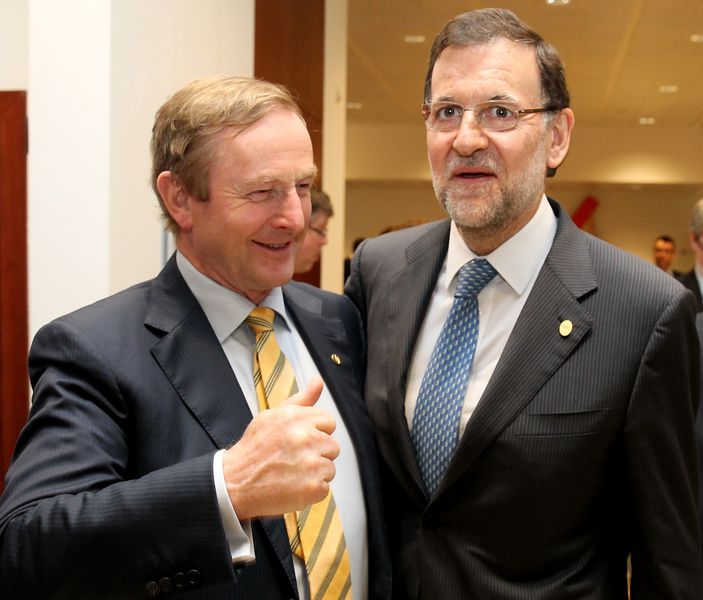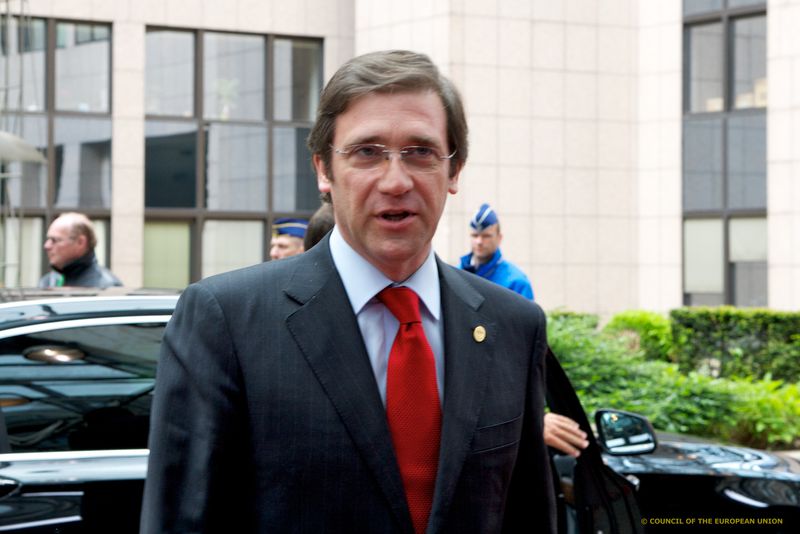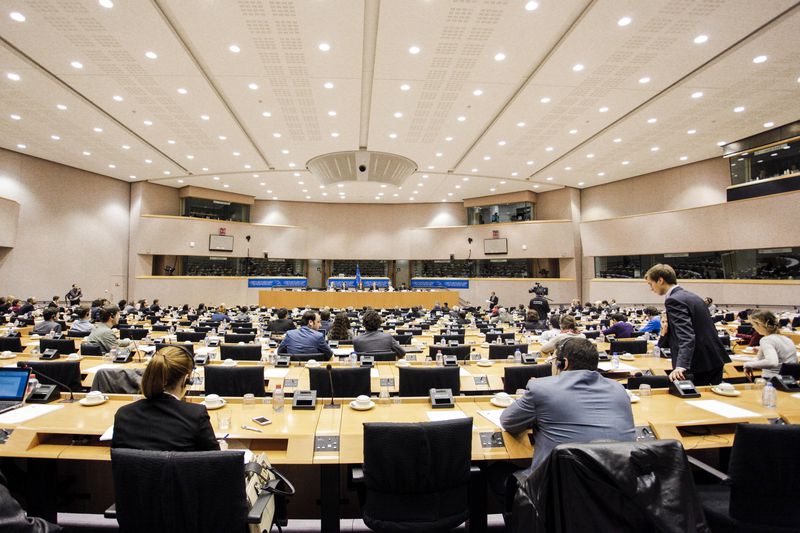Ireland Got Its Sovereignty Back, but How Independent It Actually Is?
Adelina Marini, December 18, 2013
 2013 did not begin very well for the Troika - that scary Troika which The Irish Independent described as Men in Black and which is hated in Athens, Lisbon but also in Strasbourg. The troika representatives of the European Central Bank, the European Commission and the International Monetary Fund, who united urgently in an effort to handle defaulting one after another eurozone member states. A process that began from Greece and inspired remarkable changes of the economic governance of the EU and the euro area in particular. Last winter the IMF "admitted" that not everything was quite following the Fund's rules when the decision to take part in bailing Greece out was taken, which created a serious tension between Washington and Brussels.
2013 did not begin very well for the Troika - that scary Troika which The Irish Independent described as Men in Black and which is hated in Athens, Lisbon but also in Strasbourg. The troika representatives of the European Central Bank, the European Commission and the International Monetary Fund, who united urgently in an effort to handle defaulting one after another eurozone member states. A process that began from Greece and inspired remarkable changes of the economic governance of the EU and the euro area in particular. Last winter the IMF "admitted" that not everything was quite following the Fund's rules when the decision to take part in bailing Greece out was taken, which created a serious tension between Washington and Brussels.
However, it all seems the year will end well. Ireland is officially free as of December 15th when it left its adjustment programme, moreover without expecting any additional assistance for post hospital treatment. Portugal's programme is on track, too, and the European economy is for the first time on its way out of the recession, while the perspectives also look optimistic. The situation in Greece is still fragile, but, in general, there, too, things are moving in the positive direction.
Let us not forget where we started from
The Troika is one of the most hated ad hoc institutions of the EU in Strasbourg where MEPs often criticise the policies the experts of the Commission, ECB and IMF drew to bail the troubled eurozone countries out. One of the reasons is that these policies are not discussed with the European Parliament and are drawn in a completely non-transparent way and in a lack of democratic legitimacy. After lots of efforts the Europarliament finally managed to secure hearings of Troika representatives, but this did not at all improve the bad image it has among the MEPs. That is why the last hearing for this year of the ECB chief in the European Parliament's economic committee did not pass without a demand for assessment of the Troika's work. One of the most influential MEPs in the committee, Elisa Ferreira, a Portuguese from the group of Socialists and Democrats, recalled that the Troika was always a strong defender of austerity policy.
But she also raised a fundamental question. What's next after the Troika? Mario Draghi quite concisely defended the Troika measures, recalling what was the starting position - dramatic uncertainty, lack of access to the markets, high yields, huge mountains of debt, suppressed growth. All countries' progress from the recovery process is indisputable and this should not be forgotten, Mr Draghi added defending austerism and calling on all governments not to unravel the achieved progress. The greatest lesson from the crisis, in his words, is that sustainable growth is impossible on the basis of permanent creation of debt. That is why the key is in the structural reforms. But still, however, it is not sufficiently well realised that national decisions have impact on other countries, too. This is another lesson from the crisis, namely that the crisis can spill over borders. Precisely this ignorance in terms of interconnectivity in the EU and especially in the zone of the single currency is one of the most important reasons for the lack of confidence in the EU, Mario Draghi explained.
The key is determination to implement reforms. In this sense the Irish example is quite good, but the story there is far from over, the ECB chief warned. And the data from the last mission review of the Troika show that the real recovery process for Ireland is yet to begin. In 2013 the country's fiscal deficit is expected to be 7.4% of the gross domestic product, which is 0.1 percentage point less than the ceiling in the adjustment programme. But the country has a huge public debt which this year will peak to 124% of GDP. This means that the country will continue to need fiscal consolidation, reduction of public sector indebtedness and restore lending. And here looms up another serious problem. The banking system is a  source of concern, as Mario Draghi put it, and in the Troika analysis it is pointed out that banks continue to be overburdened by low-yielding mortgages and the share of nonperforming loans is 26.6%.
source of concern, as Mario Draghi put it, and in the Troika analysis it is pointed out that banks continue to be overburdened by low-yielding mortgages and the share of nonperforming loans is 26.6%.
The Eurogroup and the Ecofin have accepted Ireland's decision not to ask for additional assistance for the transition period after leaving the adjustment programme, but it is obvious that the country will have to continue its efforts to reduce debt, put the deficit under control by, in the same time, boosting growth which, for now, is beyond expectations. For 2013 a modest growth rate of 0.3% was projected and next year it is expected to be 1.7%. IMF chief Christine Lagarde, however, believes that the levels of growth and output are much below what can be achieved and this is not valid for Ireland only. There is a huge gap between the real and forecast levels of growth and it seems that it will remain huge in the near future, Ms Lagarde said in Brussels on December 10.
At this stage, Ireland's future is to a large extent in its own hands, but unlike 2010 when it "lost its sovereignty" the situation today is much different. Dublin will no longer have to listen to the Troika, but it will have to implement the European Commission's recommendations as part of the European semester. Because of the size of its debt and deficit the country has to be included in the excessive deficit and debt procedures. Besides, the country will have to be monitored in the framework of the imbalances procedure as well. Separately, the government in Dublin has approved a 7-year strategy for economic growth, where the fundamentals are keeping fiscal discipline while in the same time shifting focus from belt-tightening to growth. In its plan, the government sets a target by 2020 the debt to fall to 90% of GDP and as of 2018 the budget to be balanced.
There could be a transitional programme for Portugal after checking out from Troika hospital
The situation in Portugal is also going on well, but Mario Draghi refused to predict when the country will be ready to exit its programme. Until the beginning of the year Lisbon and Dublin were in a package and were expected to return simultaneously on the international financial markets, but Portugal lost patience and made several mistakes that sent a negative message to the markets. One of them which Mario Draghi quoted as an example during his hearing in the economic committee on December 16th in Brussels, was that the constitutional judges in the country rebelled against the attempts their benefits to  be cut. The Troika's analysis of the implementation of the Portugal's adjustment programme is quite cautious, saying that there are not many differences with the findings in the previous quarterly review.
be cut. The Troika's analysis of the implementation of the Portugal's adjustment programme is quite cautious, saying that there are not many differences with the findings in the previous quarterly review.
It is explicitly pointed out that "continued structural reform efforts will have to be the centrepiece of a credible strategy for sustainable growth in the coming years". This creates a sense that these efforts are either not a centrepiece yet or there is a risk of stopping being. Portugal's public debt still is very high, but is declining for now in a sustainable way. In the analysis, though, can be felt a certain doubt whether the Portuguese authorities will keep their determination to implement the programme. The value of the Portuguese adjustment programme is 78 billion euros as 52 billion are paid by the EU and the IMF participates with 26 billion. Mario Draghi was also cautious on Portugal saying that for now there are clear signals that the situation is improving, but it is too early to predict when will the country be ready to exit the programme. Moreover, it will be necessary to prepare a programme for the transition period after the exit, the EU's central banker said.
Spain, too, is facing risks
The situation in Spain is also improving, but there, too, are risks. The Spanish case, though, is very much different case from all the others because the country did its utmost to avoid the Troika and succeeded to reach an agreement for recapitalisation of the banking sector. According to the IMF's analysis from the beginning of December, the implementation of the programme is well on track and the country is expected to exit when the programme expires in the end of January. In spite of the marked progress, however, there are still serious challenges for the financial sector, namely that, because of the continued fiscal consolidation and deleveraging, the dynamics of recovery could slow down which will be a problem for the banks profitability. Other problems may arise from the upcoming stress tests in the EU which precede the entry into force of the single supervisory mechanism.
That is why it is very important Spain not to put a brake on its reformists efforts and to focus mainly on supervision of banks and their preparation for the upcoming stress tests. This, however, the IMF believes, has to go hand in hand with ambitious efforts at European level to build the banking union, whose fate is expected to be decided this week.
Confidence, Sancho, is on the point of the pike of structural reforms
 In spite of the good news, it is too early for the champagne. Ireland can enjoy its "liberation", but the true liberty will come when the country reduces drastically its debts. This is valid for the other countries with adjustment programmes and also for those who have huge debts, too, but have managed to avoid default. According to Mario Draghi, the most fundamental problem is confidence. It is in the foundation of any progress in terms of European governance. The best way to restore confidence, he said responding to French Liberal MEP Sylvie Goulard, is by sticking to the agreed rules, by sharing sovereignty and by understanding that national policies can "spill over".
In spite of the good news, it is too early for the champagne. Ireland can enjoy its "liberation", but the true liberty will come when the country reduces drastically its debts. This is valid for the other countries with adjustment programmes and also for those who have huge debts, too, but have managed to avoid default. According to Mario Draghi, the most fundamental problem is confidence. It is in the foundation of any progress in terms of European governance. The best way to restore confidence, he said responding to French Liberal MEP Sylvie Goulard, is by sticking to the agreed rules, by sharing sovereignty and by understanding that national policies can "spill over".
Last but not least, he said, the right measures need to be undertaken that will ensure that the countries can stand on their own. There cannot be a union of permanent creditors and debtors. At least once in a life time a country should try to be a creditor, he advised. But this will hardly lead to an election victory, we should add with a memory to a famous remark by Luxembourg's former prime minister Jean-Claude Juncker that politicians well know what to do, but they don't know how to win the elections after that.
 Klaus Regling | © Council of the EU
Klaus Regling | © Council of the EU Mario Centeno | © Council of the EU
Mario Centeno | © Council of the EU Mario Centeno | © Council of the EU
Mario Centeno | © Council of the EU